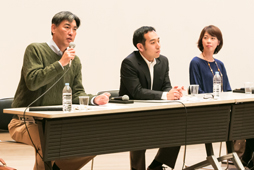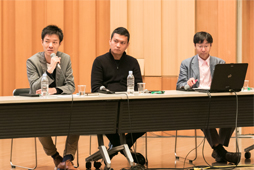“What can I experience overseas?” “How did study abroad change my life?” Those who had studied overseas shared their experiences and the significance of studying abroad to young people.


シンポジウムは留学に興味がある人たちを対象に開き、留学経験者である伊藤公平氏、土谷大氏、田所ゆかり氏、小島威裕氏、大前敬祥氏、町田大輔氏の6名が登壇しました。「留学」により、日本とは違う文化・考え方・環境に身を置くことで、“刺激を得られる”“新しい発想が生まれる”“モチベーションが向上する”といったメリットのほか、苦労した経験なども披瀝しました。
The symposium was held for those who were interested in studying abroad with six panelists Prof. Kohei Itoh, Dr. Masaru Tsuchiya, Ms. Yukari Tadokoro, Dr. Takehiro Kojima, Mr. Taka Omae, and Mr. Daisuke Machida, who have experiences studying abroad. They shared positive aspects such as being inspired, coming up with new ideas, and being motivated as they were exposed to different culture, way of thinking, and environment through studying abroad. They also shared stories during tough times.
冒頭で、司会を務める伊藤氏は「留学は日本の固定観念とは違う生きがいを見つけることができます。お金がかかるかもしれませんが、さまざまな経験が得られます」とその意義を語り、ほか5名が10分ずつ自己紹介と留学の経験を話しました。
Prof. Itoh, the moderator of this session, stated in the beginning: “You can find a new meaning in your life that is different from fixed ideas in Japan. It may cost you financially, but you will gain a lot of experience through it.” Followed by this comment, the other five panelists introduced themselves and talked about their experiences for 10 minutes each.
「若い時代に留学をして、勉強をしながらも遊んだことによって、人脈が広がった。若いうちにいろいろな経験をすべきです」と土谷氏。少年時代に宇宙飛行士の毛利衛さんから「宇宙から地球を見ると国境は見えません。だから、自分のことを日本人ではなく地球人と思えば良いんだよ」と言われたことが留学につながったと述懐しました。留学先のハーバード大学では「上には上がいる」と痛感。変わり者も多く、プロゴルファーから物理学者に転身した同級生も。当時の友人たちとは今でも交流があり、「人間としても尊敬できる世界中の仲間が一生の財産になっている」と語りました。そして、若い時にこのようなネットワークを築くことで世界中で活躍でき、キャリアパスが広がると明言、「若者には、ぜひ広い視野で世界を見てほしい」と呼び掛けました。
“Having fun while studying abroad during my youth helped me create a broad range of personal connections. It is important to experience a variety of things when you are young,” said Dr. Tsuchiya. He continued on, reminiscing his childhood memory of talking to Mamoru Mori, a Japanese astronaut, who influenced him to go study abroad. “When we see Earth from space, we cannot see the national borders. So it is better if you think of yourself as an Earthling instead of Japanese”, he recalled. At Harvard University where he studied, he realized that “there will always be people smarter than you.” There were many interesting or unique people there, including a classmate who became a physicist after being a professional golf player. He still keeps in touch with his friends from Harvard. “I am very lucky to have them in my life. It has been my lifetime treasure to have friends who I look up to all over the world,” he said. He articulated that building such a network early in life could help be successful in the world and to broaden career options. “I highly encourage young people to see the world with an open mind,” said Dr. Tsuchiya.
田所氏は、フランスへの留学経験を元に、留学のポイントを3つ紹介しました。 「最初に、確かな情報を収集してください。留学に興味を持ったら、まずは学校の先生に最新の情報を聞いてみましょう。身近なところに経験豊富な人がいるはずなので、確かな情報を得るのが留学成功の秘訣です。次に、何事にも挑戦してみるのが良いということです。留学する前は大変不安がありましたが、終えてみるととてもプラスになり、自信にもつながりました。最後に、留学先は英語圏以外も面白いということです。科学者は英語以外あまりなじみがないという認識があるかもしれませんが、近頃は英語以外の言語もグローバルになっています」と述べました。。
Ms. Tadokoro made three points in regards to studying abroad based on her experience in France. “First, try to get some reliable information about studying abroad. If you find it interesting, you can ask your teachers for the most updated information. There should be someone with a lot of experience around you, and getting reliable information is the key to success in your study abroad. Second, you should challenge yourself with anything. I was very nervous before studying abroad. But as the end approached, I felt positive of my decision and it gave me confidence. Lastly, it may also be interesting to study in a non-English speaking world. You may think that scientists mainly use English, but recently, languages other than English are also being used globally too,” he said.
エンジニアの小島氏は、まず自身の仕事における人脈の大切さを挙げました。「例えば、エンジニアがプリンタを作る際には、サイエンスの知識を身に付け、ドライバーを持って実際に組み立て、ソフトウェアも自ら作ります。そんな一連の作業において、人とのつながりというネットワークがとても大事。自分では解決できない問題に直面しても、ネットワークを使って、知り合いの知り合いと一緒に解決することができるからです。これからの時代に求められるものはネットワークです」と強調しました。
Dr. Kojima, who is an engineer himself, addressed the importance of personal connections in his work. For example, when an engineer makes a printer, he has to acquire scientific knowledge, build the actual machine with a screwdriver, and even develop the software for it. In that kind of situation, it is very important to have a network where you can connect with other people. Whenever you face a problem that you yourself cannot find the solution to, there is the possibility of solving it together with a friend of a friend, using your personal network. A network is what we will be needing from now on," he emphasized.
さらに「留学中に、自分とは異なるジャンルの人たちと触れ合う機会がたくさんあった。隣の人は歴史学者、目の前の人はビジネスマン、斜め前の人は哲学者というように、とにかくいろいろな人と交流して人脈を広げることができました」と語りました。
He continued, “there were many opportunities to meet people from different fields other than mine while studying abroad. For example, the person next to me was a historian, the person in front of me was a businessman, the person sitting in front of me diagonally was a philosopher, and so on. I was able to talk to a variety of people and expand my network,” he added.
大前氏は、「留学して海外の大学に入ることは比較的簡単だが、卒業することが日本と比べて難しい。また、海外は我が強い人が多く、チームを組む時にもみんながリーダーになりたがります」と、日本との違いについて説明。「留学を通して、文化の違いを受け入れることを学んだ。人はコンフォートゾーン(快適な領域)を抜け出し続けることで成長する。人生は一度きりなので、海外に出て見たことのない景色を見よう」と参加者に語り掛けました。
Mr. Omae explained what’s different from being in Japan: “It is relatively easy to start studying at a university in a different country, but it will be harder to graduate compared to Japan. Also, people from other countries tend to be more opinionated, and they all want to become a leader when making a team.” “I have learned to accept cultural differences through my study abroad. People grow by going out of their comfort zone constantly. You only live once, so why don't you go overseas and see something you have never seen?” encouraged Mr. Omae.
町田氏は近年のグローバル化に言及。そんな時代の中で「これからは、コミュニケーション能力、とりわけ英語で発信できることが必要とされます。また、異文化に対応できることが、グローバルに活躍するための第一歩となる。留学をすることで総合的な人間力を磨くことができるでしょう」と、留学が人間的な成長につながると語りました。
Mr. Machida mentioned the recent globalization; in such era “you will need to be able to communicate in English. Being able to handle different cultures will be the first step towards globally succeeding. Studying abroad will help you grow as a person,” referring to the relationship between studying abroad and personal development.
会場から「留学を決めた際に、また留学先でどんな苦労をしたのか」という質問に各登壇者はこう答えました。
There was a question from the floor: “what was the hardest thing you had to go through when you decided to study abroad and while you were there?” Each panelist answered:
「一番苦労したのはアメリカの大学に入ってから。大学院1年生の時にノートがとれないこともあり、泣きそうになった。だけどそれを乗り越えて、段々とできるようになっていった。苦労もあったけど楽しかったです」(土谷氏)
“I had the biggest struggle when I started graduate school in the US. In my freshman year, I almost cried because I could not take notes. But I overcame it and gradually became capable of working on it step by step. There were some rough moments, but it was fun” (Dr. Tsuchiya)
「大学院生を終えるころに留学を考え始めたのですが、なかなか踏み出せずにいた。実際に留学したのは30歳になってから。英語の基準点を満たすのに二十回以上試験を受けました」(小島氏)
“I started thinking about studying abroad toward the end of graduate school, but it took me a while to decide. I finally did study abroad at the age of 30. I had to take English tests more than 20 times to meet the requirement” (Dr. Kojima)
「大学時代に交換留学で語学留学に行きましたが、メンバー8人の中で私が一番できませんでした。ホームステイ先では家族と上手く話せずもどかしい思いをし、この経験からフランス語をもっと話せるようになりたいと、大学院の留学を挑戦するきっかけになりました。大学院での授業は大変でしたが、やらなきゃならないことを乗り越えていくうちに、伸びていきました」(田所氏)
“During college, I went to a language school through an exchange program, but among the eight members, I was the least fluent in French. I was frustrated that I could barely communicate with my host family, but it helped me realize that I wanted to learn more French and motivated me to once again study abroad during graduate school. The classes were much more complex, but the more I was required to study, the more I improved.” (Ms. Tadokoro)
「受験など、留学する前も辛かったですが、留学してからの苦労の方が比べものにならないくらい辛かった。大学に入るまでの苦労を一瞬で忘れてしまうほど。だけど、社会人になってからの方がもっと修羅場がありました。ですから過去の苦労というのは、笑い話にしかならないのではないでしょうか」(大前氏)
“Applying to schools was tough enough, but it was nothing compared to after I started studying abroad. It almost made me forget all the struggles I went through when applying. But there were even tougher challenges after I started working. So I guess all the hardships from the past become nothing but funny stories in the end.” (Mr. Omae)
留学で楽しかったことを聞かれ、田所氏は「パリでの生活は楽しかった。美術館やバレエを格安で見ることができました。文化的な面に多く触れることができたことが良かった。後は洋服がおしゃれなので、ショッピングを楽しみました」。また、小島氏は「たくさん交流ができて、友達との生活が楽しかったです。苦労を徐々に乗り越えていったのが、今思うと楽しかったと感じています」と答えました。
The panelists were asked about the things they enjoyed during study abroad. Ms. Tadokoro said, “It was fun living in Paris. I could see the art museums and ballet performances on budget. It was nice to be able to get exposed to a lot of cultural aspects. And I enjoyed shopping because there were many fashionable clothes.” Dr. Kojima responded, “I had fun living with my friends and interacting with them. Now that I think about it, it was also nice overcoming challenges little by little.”
このほか大学の選択について大前氏は、「日本人は知らなくても、世界的には有名な名門校もある。日本だけの物差しで見ないことが大事です。現在日本のメディアで有名大学と言われている大学に入ったとしても、必ずしも将来的に活躍できる人材になれるとは限らない。このような視点を持っていれば、アメリカやヨーロッパの大学以外でも選択肢が広がります」と持論を展開しました。
Besides that, Mr. Omae said, “There are world famous schools that Japanese people do not know. It is important not to make judgments only based on Japanese standards. Getting into a university that the Japanese media consider one of the best does not necessarily guarantee your success in the future. If you have this kind of perspective, you can also choose from universities outside the US or Europe.”
留学後に日本企業への就職が難しかったのではないか、との司会者の質問に田所氏と大前氏がこう答えました
Then Ms. Tadokoro and Mr. Omae responded to the question from the moderator about the difficulties to get a job in Japanese companies after studying abroad as follows:
「一番の不安は留学を終えて就職できるのかということでした。一括採用をしているのは日本くらいなので、これから変えていかなければならないと思います」(田所氏)
“After finishing my study abroad, my biggest concern was whether I could find a job in Japan or not. Japan is probably the only place in the world that companies employ new graduates all at once, and I think that needs to change in the future” (Ms. Tadokoro)
「日本の企業の人事担当者が必ずしも海外の大学を知っている訳ではなく、判断する知見を持っていない場合もある。ただ、海外の大学を出た学生ということでひとくくりにされる傾向があるので、国内の大学を卒業した学生との差別化は図れるでしょう。まだこの流れは変わらないので、企業からは興味を持ってもらえると思います」(大前氏)
“Those in the human resources department in Japanese companies do not always know about universities abroad, or they might not have the standards to make judgments about them. But it is likely that they categorize all the graduates from universities in different countries, so you can easily differentiate yourself from other graduates who have studied at Japanese universities. This trend won’t change immediately so you probably won’t have trouble getting attentions from companies.” (Mr. Omae)
最後に、海外は治安が悪く危ないのではないかとの質問に、各々が答えました。
Lastly, each presenter answered the question about safety in other countries.
「危ないからという理由で留学を止めてしまうのはもったいないこと。確かな情報を収集してから判断するのが良いでしょう」(田所氏)
“It is a pity not to go study abroad because you may think it is dangerous. It is better to make a judgment after you do your research and have reliable information” (Ms. Tadokoro)
「自分で自分を守る術が身に付きます。それに、海外に比べて東京がこれからも安全とは言い切れないのではないでしょうか」(小島氏)
“You'll learn how to protect yourself. And, I guess we cannot say that Tokyo will be safe in the future, compared to other cities in the world” (Dr. Kojima)
「留学先で危険な目にも遭ったが、統計を見ると海外で不慮の事件・事故に巻き込まれる確率よりも、日本で交通事故に遭う確率の方が断然高い。これを理由に留学を止めるのはナンセンスだと思います」(大前氏)と、リスクを恐れて留学への意欲をしぼめないという意見で一致しました。
“I faced some dangerous situations when I was studying abroad. But looking at the statistics, it is more likely to be in a traffic accident in Japan than be in an unexpected incident and accident overseas. I think it is nonsense to give up studying abroad worrying about security risks.” (Mr. Omae) All panelists agreed on not losing the desire to study abroad because of risks.
留学における各登壇者の苦労体験談や成功体験談を聞くことで、留学のさまざまな選択肢が見えてきました。また、名前を聞いたことのある大学を目指すのも良いですが、グローバルに考えれば他の選択肢もたくさんあるのだと分かりました。自分がやりたいことを元に大学や留学先を決めるという考え方が大事、という話が印象的でした。(須藤渉)
Thanks to all the panelists sharing their successful and challenging stories, I began to see various options for studying abroad. I also learned that there are options around the world other than famous schools. A panelist said that it is important to decide a university or where to go based on what you want to do. That advice was something that I would definitely keep in mind. (Wataru Sudo)